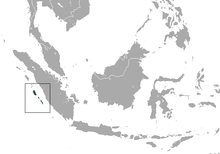- Pig-tailed langur
-
Pig-tailed langur[1] Conservation status Scientific classification Kingdom: Animalia Phylum: Chordata Class: Mammalia Order: Primates Family: Cercopithecidae Subfamily: Colobinae Genus: Simias
Miller, 1903Species: S. concolor Binomial name Simias concolor
Miller, 1903
Pig-tailed Langur range The pig-tailed langur (Simias concolor, monotypic in genus Simias) is a large, rather heavily built Old World monkey, which is adapted to climbing with its long arms. Its fur is black-brown, and its hairless face is also black. It is the only monkey in the subfamily Colobinae to have a relatively short tail; the tail is only slightly furred and is only 15 cm long. The short nose is pointed upward. The pig-tailed langur reaches a full grown length of approximately 50 cm and a weight of 7 kg. Traditionally, it has been placed in the genus Nasalis together with the proboscis monkey - a treatment still preferred by some.[3]
This primate lives only on the Mentawai Islands, where it is known as Simakobou in Siberut and Simasepsep on the southern islands of Sipura, North Pagai, and South Pagai. Two of these islands, North- and South-Pagai, are its main range. It is a diurnal and arboreal rain forest dweller, rarely coming to the ground. It lives in small groups (3 to 8 animals), which consist of a male, one or more females, and their offspring. Its diet consists mainly of leaves and, to a lesser extent, fruits and berries. Nothing of its reproduction is known.
The species is considered to be one of "The World's 25 Most Endangered Primates."[4]
Subspecies
- Genus Simias
- Pig-tailed langur, Simias concolor
- Simias concolor concolor
- Simias concolor siberu
- Pig-tailed langur, Simias concolor
References
- ^ Groves, C. (2005). Wilson, D. E., & Reeder, D. M, eds. ed. Mammal Species of the World (3rd ed.). Baltimore: Johns Hopkins University Press. pp. 175. OCLC 62265494. ISBN 0-801-88221-4. http://www.bucknell.edu/msw3/browse.asp?id=12100702.
- ^ Whittaker, D. & Mittermeier, R. A. (2008). Simias concolor. In: IUCN 2008. IUCN Red List of Threatened Species. Downloaded on 4 January 2009.
- ^ Bradon-Jones, D., A. A. Eudey, T. Geissmann, C. P. Groves, D. J. Melnick, J. C. Morales, M. Shekelle, and C. B. Stewart. 2004. Asian primate classification. International Journal of Primatology. 23: 97-164.
- ^ Mittermeier, R.A.; Wallis, J.; Rylands, A.B. et al., eds (2009) (PDF). Primates in Peril: The World's 25 Most Endangered Primates 2008–2010. Illustrated by S.D. Nash. Arlington, VA.: IUCN/SSC Primate Specialist Group (PSG), International Primatological Society (IPS), and Conservation International (CI). pp. 1–92. ISBN 978-1-934151-34-1. http://www.primate-sg.org/PDF/Primates.in.Peril.2008-2010.pdf.
The World's 25 Most Endangered Primates Madagascar Greater bamboo lemur (Prolemur simus) · Gray-headed lemur (Eulemur cinereiceps) · Blue-eyed black lemur (Eulemur flavifrons) · Northern sportive lemur (Lepilemur septentrionalis) · Silky sifaka (Propithecus candidus)Africa Rondo bushbaby (Galagoides rondoensis) · Roloway monkey (Cercopithecus diana roloway) · Tana River red colobus (Procolobus rufomitratus) · Niger Delta red colobus (Procolobus epieni) · Kipunji (Rungwecebus kipunji) · Cross River gorilla (Gorilla gorilla diehli)Asia Siau Island tarsier (Tarsius tumpara) · Javan slow loris (Nycticebus javanicus) · Pig-tailed langur (Simias concolor) · Delacour's langur (Trachypithecus delacouri) · White-headed langur (Trachypithecus p. poliocephalus) · Western purple-faced langur (Trachypithecus vetulus nestor) · Gray-shanked douc (Pygathrix cinerea) · Tonkin snub-nosed langur (Rhinopithecus avunculus) · Eastern black crested gibbon (Nomascus nasutus) · Western hoolock gibbon (Hoolock hoolock) · Sumatran orangutan (Pongo abelii)Neotropics Cottontop tamarin (Saguinus oedipus) · Brown spider monkey (Ateles hybridus) · Yellow-tailed woolly monkey (Oreonax flavicauda)Categories:- IUCN Red List critically endangered species
- Mammals of Asia
- Mammals of Indonesia
- Colobine monkeys
- Animals described in 1903
- Genus Simias
Wikimedia Foundation. 2010.

